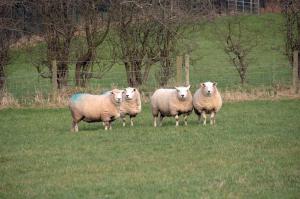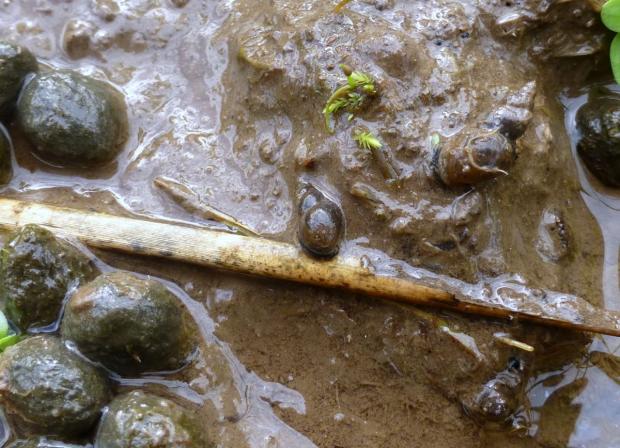Autumn and Winter Liver Fluke Forecast for Northern Ireland 2018-2019
Date published:
The Agri-Food and Biosciences Institute (AFBI) wishes to bring to the attention of farmers the need to consider the risk of liver fluke infection in cattle and sheep this autumn and winter.

Using a forecasting system based on climate data, staff at the Institute have predicted that although overall risk of liver fluke infection during this autumn and winter will be moderate across Northern Ireland, there will be some areas where the risk will be high.
This year saw levels of rainfall during the summer months considerably lower than last year. In May, June and September rainfall was reduced by 14% - 35% below the Northern Ireland average, with July being the only month with a mean monthly rainfall level slightly higher than average. This year also saw mean monthly temperatures rise higher than the Northern Ireland average. The lower rainfall levels, higher temperatures and drier conditions this summer would have allowed many areas to dry out which would have reduced the ability of the intermediate host, the snail Galba truncatula, to breed and reduced the likelihood of development of fluke to occur within the snails.

Liver fluke disease can occur in either acute or chronic forms. The acute form occurs in sheep and is caused by the migration of large numbers of immature flukes through the liver. Acute liver fluke is often fatal and has serious welfare implications. Signs of severe infections include distended painful abdomen, anaemia and sudden death. In less severe cases, poor production and growth, coupled with reduced appetite and abdominal pain are apparent. Chronic liver fluke disease is more common than the acute form and occurs in both sheep and cattle, usually during the winter and spring, although infection can persist throughout the year. Affected animals may exhibit ‘bottle jaw’ (swelling under the jaw).
Fluke infection can cause a reduction of 5-15 per cent in the milk yield of dairy cows and reduction of growth in fattening lambs and cattle. It is therefore a source of considerable financial loss to the local agricultural industry. Fluke infections in dairy cattle can also predispose to metabolic conditions such as ketosis and infectious diseases such as salmonellosis. The same is likely to be true for sheep. Migrating liver fluke can also predispose animals to the clostridial infection, Black disease, and care should be taken to ensure that cattle and sheep in fluke-affected areas are fully vaccinated against this disease.
All farmers should review their fluke control measures at this time of year. Access to snail habitats (wet and poorly drained areas) should be reduced or sheep taken off the land and housed or moved to new clean pasture. However, in most cases, control will be based on the strategic use of anthelmintics, employing a product effective against the life cycle stages likely to be present in the flock or herd at the time of treatment. This is particularly important in autumn when acute fluke infection occurs in sheep and pick-up of infection by sheep and cattle is still taking place. At this time of year a product effective against both immature and mature forms is needed. Use of such a product on out-wintered sheep once or twice in autumn, with possible follow up in January, coupled with a treatment effective against adult flukes in early spring, should significantly reduce the fluke burden on individual farms.
Treatment of chronic (adult) infections in cattle as well as sheep during the winter or early spring is important to help reduce pasture contamination with fluke eggs. Use of an anthelmintic with activity mainly against adult flukes may be sufficient in these circumstances. However the flukicide programme used has to be on a ‘know-your-farm’ basis and no one set of recommendations will cover all flocks or herds.
Farmers need to be aware that resistance to fluke treatments is an emerging problem and has been detected in Northern Ireland. On some premises, products containing triclabendazole (the only flukicide currently licensed in UK and Ireland that is effective against the immature stages of liver fluke, causing acute fasciolosis in sheep) have been used almost exclusively for a number of years. On such farms it is possible that triclabendazole-containing products may now be less effective in controlling fluke infection, and for treating acutely-ill animals. The effectiveness of anthelmintic treatment on individual farms can be checked by taking dung samples 3-4 weeks after treatment and submitting them, through your veterinary surgeon, for laboratory examination.
In recent years, stomach (rumen) flukes have also become common in sheep and cattle in NI, and this is particularly the case in fluke-prone areas. Adult rumen flukes are less damaging to sheep and cattle than liver flukes, but heavy infections of immature worms may cause diarrhoea, ill-thrift and, exceptionally, death in young animals. If you suspect that stomach fluke infection may be a problem on your farm, you should contact your veterinary surgeon to arrange for appropriate laboratory testing, and to discuss treatment options.
Advice on the most suitable anthelmintic and other control measures can be obtained from your veterinary surgeon. The AFBI veterinary laboratories at Stormont and Omagh can assist your veterinary surgeon by testing dung and blood samples from livestock for evidence of fluke infection and associated liver damage. Further information on liver fluke disease in cattle and sheep may be found on the AFBI website.
Notes to editors:
AFBI carries out high quality technology research and development, statutory, analytical, and diagnostic testing functions for DAERA and other Government departments, public bodies and commercial companies.AFBI's Vision “Advancing the Local and Global Agri-Food Sectors Through Scientific Excellence”. All media enquiries to AFBI Press Office